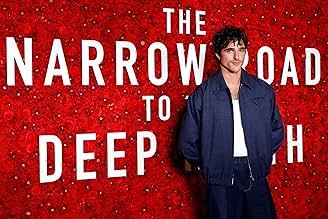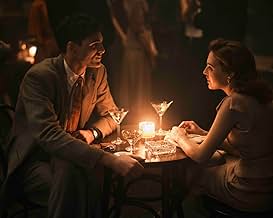Burma Railway im Jahr 1943 und über den Pazifik während des Zweiten Weltkriegs, schildert die Grausamkeit des Krieges, die Zerbrechlichkeit des Lebens und die Unmöglichkeit der Liebe, gesehe... Alles lesenBurma Railway im Jahr 1943 und über den Pazifik während des Zweiten Weltkriegs, schildert die Grausamkeit des Krieges, die Zerbrechlichkeit des Lebens und die Unmöglichkeit der Liebe, gesehen durch die Augen eines Australiers.Burma Railway im Jahr 1943 und über den Pazifik während des Zweiten Weltkriegs, schildert die Grausamkeit des Krieges, die Zerbrechlichkeit des Lebens und die Unmöglichkeit der Liebe, gesehen durch die Augen eines Australiers.
- Auszeichnungen
- 1 Nominierung insgesamt
Folgen durchsuchen
Empfohlene Bewertungen
I do not know whether the events in this mini-series really happened or not. They do look pretty genuine to me though.
The storyline is quite complex, whereby they basically consist of three separate stories that are all experienced by the same person. Three stories that the viewer will experience in 5 episodes, which are a continuous back-and-forth between all these different stories.
First of all, this mini-series is about a love story. This whereby the main character is challenged to choose between his already existing relationship with a girl that is part of the most elite family in Australia. Next to her, he experiences real love with the young wife of his uncle.
Second, this mini-series is about the main character having to go to war (WW2), whereby he eventually ends up in a Japanese POW camp. Located in Thailand, he and his fellow soldiers experience how truely evil man can be. As POW's, they are forced to work on the infamous "Burma Railway", which is also known as the "Railway of Death".
Third and last, this mini-series is about the main character being at old age, whereby he is a successful surgeon. This part of the story is about looking back to his past. You see the struggles that defined him in all his years post-war. I see in this part a message that the horrors of war can not be explained other than by really experiencing themselves. And this whereby these war experiences will define a person for the rest of his life.
Considering the complexity of the 3 above-mentioned stories, it takes some time to really understand who is who and what exactly you are watching. After having watches all five episodes, I went back and rewatches episode one. And this caused me to really better understand the events that took place at the start of the mini-series. I therefore think that the director of this mini-series might have made a mistake in mixing the three stories. Maybe it would have been a better choice to show all events in a chronological way. But no matter what, in its current state it still is a great watch. You will just need some time in episode one and two to get accustomed to who is who and what events you are looking at. I guarantee you though that this mini-series will leave quite some impression on you in episodes three and four... This where you will experience the true horrors of life in a Japanese POW camp.
A combination of great acting and truely breathtaking cinematography - especially the scenes that take place in the POW camp are "eye candy" - this mini-series is a great experience to watch.
Overall, I score this mini-series as 8.1/10, resulting in a well-deserved 8-star IMDb rating. Especially the story that takes place in the POW camp make this mini-series a very worthwile watch and a reminder of the cruelties that took place during WW2.
The storyline is quite complex, whereby they basically consist of three separate stories that are all experienced by the same person. Three stories that the viewer will experience in 5 episodes, which are a continuous back-and-forth between all these different stories.
First of all, this mini-series is about a love story. This whereby the main character is challenged to choose between his already existing relationship with a girl that is part of the most elite family in Australia. Next to her, he experiences real love with the young wife of his uncle.
Second, this mini-series is about the main character having to go to war (WW2), whereby he eventually ends up in a Japanese POW camp. Located in Thailand, he and his fellow soldiers experience how truely evil man can be. As POW's, they are forced to work on the infamous "Burma Railway", which is also known as the "Railway of Death".
Third and last, this mini-series is about the main character being at old age, whereby he is a successful surgeon. This part of the story is about looking back to his past. You see the struggles that defined him in all his years post-war. I see in this part a message that the horrors of war can not be explained other than by really experiencing themselves. And this whereby these war experiences will define a person for the rest of his life.
Considering the complexity of the 3 above-mentioned stories, it takes some time to really understand who is who and what exactly you are watching. After having watches all five episodes, I went back and rewatches episode one. And this caused me to really better understand the events that took place at the start of the mini-series. I therefore think that the director of this mini-series might have made a mistake in mixing the three stories. Maybe it would have been a better choice to show all events in a chronological way. But no matter what, in its current state it still is a great watch. You will just need some time in episode one and two to get accustomed to who is who and what events you are looking at. I guarantee you though that this mini-series will leave quite some impression on you in episodes three and four... This where you will experience the true horrors of life in a Japanese POW camp.
A combination of great acting and truely breathtaking cinematography - especially the scenes that take place in the POW camp are "eye candy" - this mini-series is a great experience to watch.
Overall, I score this mini-series as 8.1/10, resulting in a well-deserved 8-star IMDb rating. Especially the story that takes place in the POW camp make this mini-series a very worthwile watch and a reminder of the cruelties that took place during WW2.
I really wanted to watch this series. However, as seems to be a cinematography trope with some films and series these days, e.g. 'Nosferatu' I could not see the actors faces in a lot of the scenes as it's been colour graded with a dark hue that prevents me being able to see the nuances in the characters interactions. This artistic choice spoiled it for me. Does the darkness represent the lead characters ethical/moral struggles as complex multilayered people and the inhumanity and darkness of war and it's ongoing residue in their minds, probably, but I would have preferred to be able to see them struggling with these emotions. I tried really hard as the acting, set design and direction are striving towards something truthful and beautiful but ruined in my opinion by the cinematography. The actors commitment to their roles is admirable, however in search of truth the actors sometimes belong to the mumble, whisper my lines style that makes the dialogue unintelligible. Maybe it's my smart TV's inability to render it watchable, but I doubt it!
Had high expectations, but was very disappointed. The misty, murky photography made it hard to watch and I gave up. The lead actor mumbles his way through the episodes and Ciarin Hind's Aussie accent is even worse, and he too mumbles. The producer should have hired someone who knew how Aussies spoke in 1941, because they certainly did not call a dinner jacket , a tuxedo, nor say hi in a formal setting. I know the series is based on a book, which I have not read, but the movie, Bridge on the River Kwai was better and if you want to know about the hardships suffered by Aussies in Japanese POW camps, read about Sir Weary Dunlop.
My Spanish grandmother was under house arrest during the Japanese occupation of British North Borneo during the war. She told me stories of the treatment of Australian soldiers held captive. This show is serious television. It is part English Patient, Tree of Life, Thin Red Line, and Bridge over River Kwai. It is haunting, erotic, intimate, brutal, humanistic, and historical. This was a show made to honor the fallen and to preserve memories and experiences and is unflinching. It is the kind of series that will penetrate your dreams, make you feel small, and humble you. These kinds of series are not often made. The showrunners are owed gratitude and respect for having pursued this undertaking. It is unabridgedly effective.
One of the best and the hardest show I have ever watched. I sat watching this with my father next to me telling me of the stories his father would tell him of working the Thai-Burma railway in those very conditions. I watch as he had tears telling me this was like a visualization of those very stories. The story was well written and the characters were all play so well. The cinematography was brilliant despite what other reviewers say, you felt as though you were there in that jungle and the soundtrack was haunting and will stick with you. It left me very shaken but was well worth the watch, would highly recommend but be warned it is very full on and doesn't shy away from brutality.
Wusstest du schon
- WissenswertesThe last survivor of those that built the railway died in January 2024.
Top-Auswahl
Melde dich zum Bewerten an und greife auf die Watchlist für personalisierte Empfehlungen zu.
- How many seasons does The Narrow Road to the Deep North have?Powered by Alexa
Details
Zu dieser Seite beitragen
Bearbeitung vorschlagen oder fehlenden Inhalt hinzufügen

Oberste Lücke
What is the Canadian French language plot outline for The Narrow Road to the Deep North (2025)?
Antwort









































